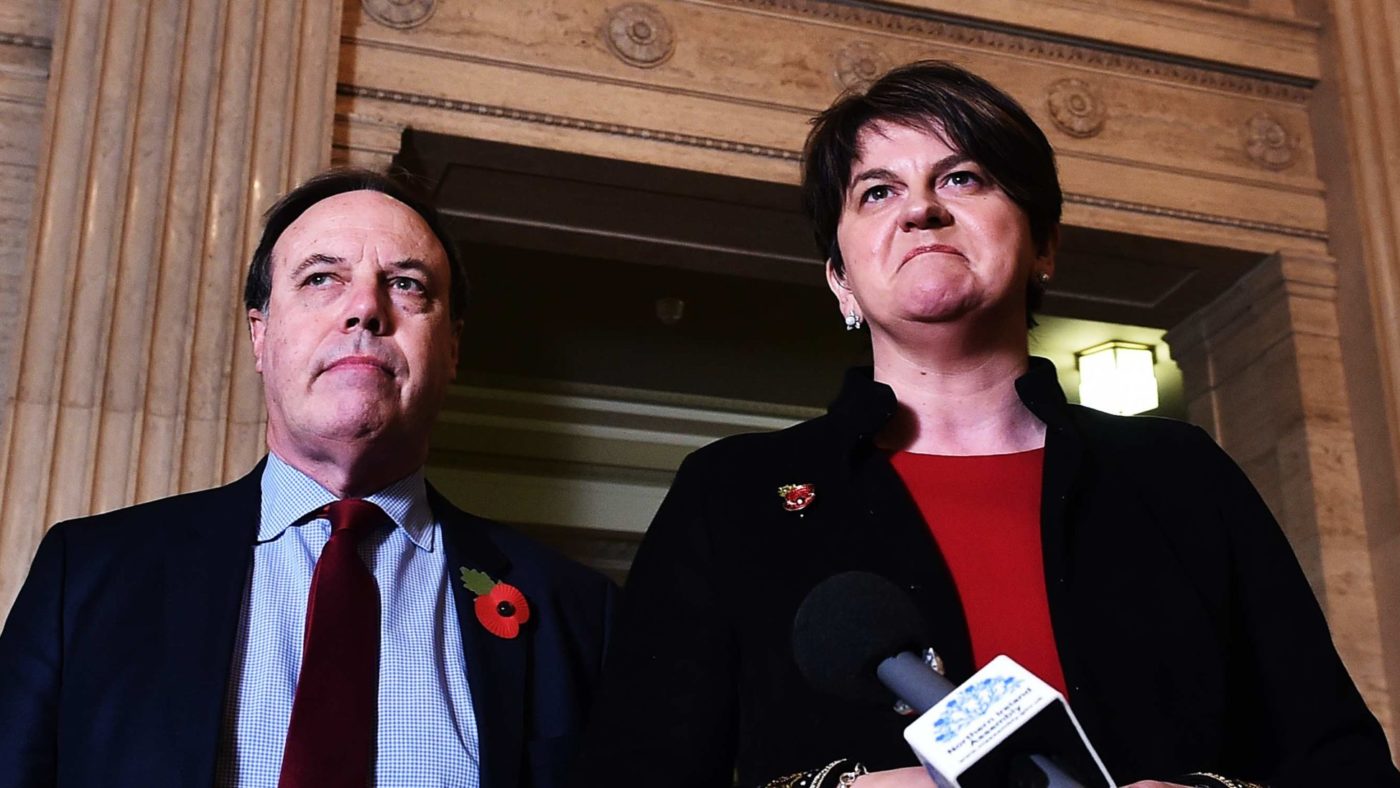In this morning’s Belfast News Letter, Sir Jeffrey Donaldson set out the DUP’s terms for supporting Theresa May’s Brexit withdrawal deal. “We need to see an end to the backstop,” the Lagan Valley MP demanded, ahead of his party’s annual conference this weekend, “it is now clear the EU are beginning to accept that there are alternative arrangements that can be put in place.”
Donaldson was alluding to possible hi-tech solutions to the Irish border issue, references to which were included in yesterday’s political declaration on the UK’s future relationship with Brussels. The 26-page document conceded that, “facilitative arrangements and technologies will be considered in developing any alternative arrangements for ensuring the absence of a hard border on the island of Ireland on a permanent footing.”
The problem is that the ‘political declaration’ is a deliberately vague and aspirational statement of the two sides’ ultimate goals, while the draft withdrawal agreement, that includes the so-called backstop, is intended to be legally binding. The DUP’s difficulty is that while it has been effective, for the most part, in explaining what it opposes, it is less convincing when it comes to articulating what it wants from the Brexit process.
At a superficial level, the party’s aims are simple enough.
The DUP wants Northern Ireland to leave the European Union on exactly the same terms as the rest of the UK. While its good faith on the issue has sometimes been called into question, it has also consistently advocated an unobtrusive land border between Northern Ireland and the Republic. If the DUP’s ideas about the ideal Brexit are a little confused and contradictory, the same could be said of any of the parties at Westminster.
The party’s most bullish Brexiteer MPs, Sammy Wilson and Ian Paisley junior, seem convinced fully by the notion of a freewheeling, low regulation Global Britain, striking trade deals across the world. Wilson has fretted publicly about the consequences of the UK tying itself too closely to the EU customs union. Arlene Foster, the party’s overall leader, and Nigel Dodds, its leader at Westminster, take the more measured position that their only ‘red-line’ is an internal border in the Irish Sea.
The DUP’s insistence that it opposes any differentiation from the rest of the UK is easy to mock, due to its support for separate legislation on social issues in Northern Ireland. The party has stubbornly vetoed attempts to reform laws on same-sex marriage, abortion and even defamation, so that they are more in line with Great Britain. It argues that the whole point of devolution is to allow differences across the UK, while more fundamental matters of policy are decided at national level, by Westminster.
Constitutionally, it is a sound point, but its critics allege that the DUP is instinctively hostile toward many of the values that modern Britain takes for granted and that its outlook is deeply parochial and self-interested. This view of the party has been bolstered by an inquiry into the RHI scandal at Stormont, when its ministers and advisers were implicated in wasting half a billion pounds on a green energy scheme, and its emphasis on securing public money for Northern Ireland during negotiations to strike a ‘confidence and supply’ deal with the Conservatives.
Traditionally, the DUP certainly represented a more insular strand of Ulster unionism and its origins were in the rabble-rousing, intolerant politics of former leader, Ian Paisley. Yet, because of its success, the party now represents a much broader coalition of interests; including unionists who are more focused on Northern Ireland’s participation in the economy, society and politics of the UK.
This year, the DUP’s conference could have been a celebration of the party’s new national prominence. Reports suggest that both Philip Hammond and Boris Johnson are likely to address delegates in Belfast this weekend; though the chancellor must be wary of receiving an embarrassingly chilly reception.
When the Ulster Unionists formed a pact with David Cameron’s Conservatives for the 2010 General Election, the DUP attacked them viciously, erecting a campaign billboard reading, “I want an MP who answers to us — not to the Tories.” Just seven years later, the party seemed to have usurped its rival’s pan-UK vision, by providing Northern Irish voters with real influence at government level. Now, it’s at loggerheads with the prime minister, who has brokered a Brexit deal that will potentially create a permanent and ever-deepening divide between Northern Ireland and the rest of Britain.
If the DUP ever had a coherent vision for leaving the EU and how, ideally, Northern Ireland’s links with the rest of the country, the rest of Ireland and the rest of Europe would work after Brexit, surely, by now, it has been jettisoned for an exercise in damage limitation. The party has tended to ally itself with harder-edged Tory Brexiteers and now it is dependent on that compact holding, if it is to avoid the Irish Sea border that it always opposed so vehemently.
When Arlene Foster spoke at a Policy Exchange seminar on the future of the Union back in May, she said that the form of unionism she wanted to see was, “confident, outward looking and welcoming.” Months later, her party looks anything but confident, as it struggles to prevent a withdrawal agreement that puts Northern Ireland under the control of Brussels.
If the DUP has any chance of achieving its aims, and if it is to make a relevant contribution to the Brexit debate, it must stress that Northern Irish voters are entitled to participate fully in the political, social and economic life of the United Kingdom — even if that message is to the detriment of some of the party’s more parochial concerns.


